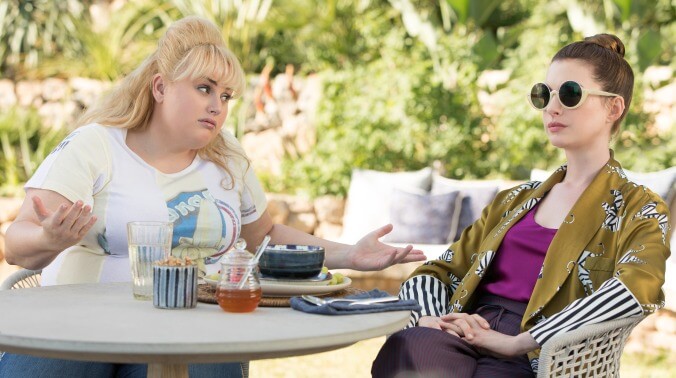When it comes to source material to plug into the trend of gender-flipped comedy remakes, Dirty Rotten Scoundrels isn’t actually a bad choice. The 1988 Frank Oz film—itself a remake of a 1964 Marlon Brando/David Niven comedy—is in many ways already about gender. Steve Martin and Michael Caine play con artists who prey upon rich women’s emotional vulnerabilities, only to discover that they themselves have many of those same vulnerabilities. (It may star two men, but Dirty Rotten Scoundrels has a little bit of a feminist bent too.) There’s potential in seeing that story retold through a new lens. Yet while The Hustle is more overt when it comes to discussing gender, including a monologue about why women are better suited to “the con” than men, it doesn’t really have all that much to say. Not about gender, not about con artistry, and definitely not about how to craft a satisfying studio comedy.
Unlike Ghostbusters, Ocean’s 8, and What Men Want, The Hustle is a full-on remake, not a gender-flipped reimagining. Crass, small-time Australian con-woman Penny Rust (Rebel Wilson) decides to set up shop in the luxurious French Riviera town of Beaumont-sur-Mer, where she ruffles the feathers of high-class con artist Josephine Chesterfield (Anne Hathaway), who’s already got a glamorous arrangement in the area. Josephine initially agrees to mentor Penny, before the two settle on a wager: Whoever is the first to swindle $500,000 from nerdy tech billionaire Thomas (Alex Sharp) will get to claim Beaumont-sur-Mer for herself. The screenplay, credited to several writers, reworks and modernizes some of the elements of Dirty Rotten Scoundrels, but the basic story beats are nearly identical. That means The Hustle will probably play best for those less familiar with the twists and turns of the source material, as there aren’t too many new surprises.
In his feature directorial debut, The Thick Of It actor turned Veep director Chris Addison struggles to find the heart of the story he’s telling. The film’s brisk 94-minute runtime is welcome; less so an extended montage of Josephine training Penny in the art of knife throwing when that has absolutely no bearing on any of the cons they pull. The Hustle seems very anxious about being funny, often sacrificing logic for easy jokes or whatever will allow Hathaway to vamp it up in increasingly ridiculous accents. Though the performers are game and the costume and production design appropriately stylish, The Hustle plays like a messy first cut of a better, funnier comedy. The highpoint comes early, in a mod-inspired opening title sequence that’s far more fun than the film that follows.
For all its talk of criminal female empowerment, The Hustle isn’t afraid to find flaws in its two female leads, which could be a welcome twist if the film explored it more. Unfortunately, The Hustle underserves the thread of poignancy that sits at the heart of any version of Dirty Rotten Scoundrels (including a pretty great Broadway musical adaptation from the 2000s). Despite their headbutting, Josephine and Penny are kindred spirits in a con artist life that can get awfully lonely at times. Their begrudging partnership, and their complicated relationship with their kindhearted mark, ultimately hinges on the fact that—as the cliché goes—the real con is the friends they made along the way. Yet The Hustle merely gestures at those emotional beats rather than truly landing them. Isn’t It Romantic demonstrated that Wilson is more than capable of delivering genuine pathos in addition to her signature pratfalls; here, she’s not allowed to shine in the same way.
Despite its glitz and glam, The Hustle is mostly bland and familiar, even if you’ve never seen its predecessor. A good con movie should feel clever in the moment and even more satisfying once all the puzzles pieces snap into place. The Hustle settles for being generally amiable instead, content to offer some chuckles here and there but little in the way of laugh-out-loud comedy or satisfying surprises. To rise above the pack of tepid studio comedies, it needed more, well, hustle.


